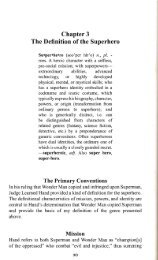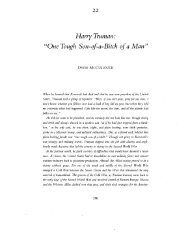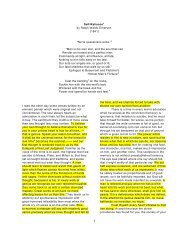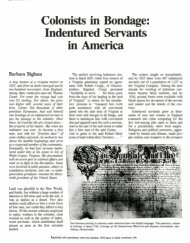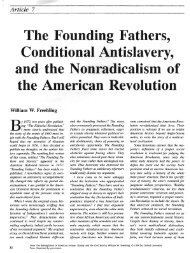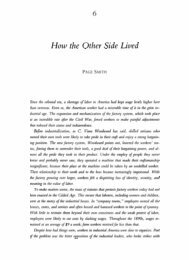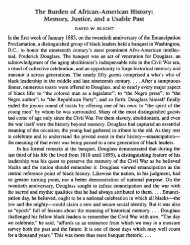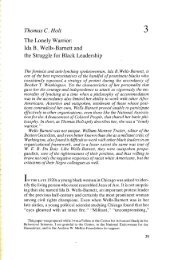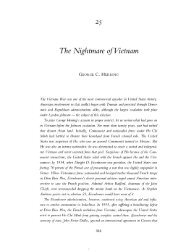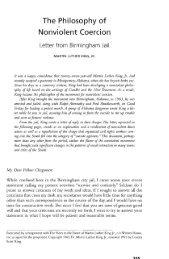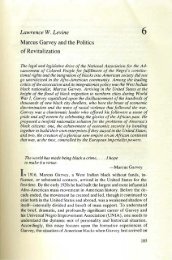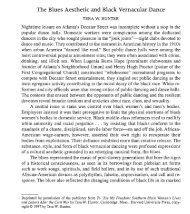22_ From Slavery to Freedomown discretion. In the spring of 1861, blacks sought refuge within federal linesnear Fortress Monroe in Virginia. When General Butler learned that slaves hadbeen employed in erecting Confederate defenses, he immediately declared thatthey were "contraband of war" and should not be returned to their owners. Instead,they were put to work for the Union forces. For several months it wasnot at all clear that the authorities in Washington would endorse his action,and several replies from the War Department to his requests for a clarificationof policy were evasive.In June 1861 several military officers spoke out in favor of returning allfugitives. In the West, General Halleck adopted this policy. But the lack of anyuniform policy was clearly indicated by two developments in July 1861. OnJuly 9 the House of Representatives passed a resolution declaring it was not theduty of federal troops to capture or return fugitive slaves. One week later, GeneralWinfield Scott wrote Brigadier General McDowell, in the name of PresidentLincoln, asking him to allow owners of fugitive slaves in Virginia to cross thePotomac and recover runaways who had taken refuge behind Union lines.Small wonder that there was so much dissatisfaction among abolitionists withregard to federal policy. Phillips, Sumner, and Garrison openly attacked thegovernment and demanded a more forthright stand on fugitives and emancipation.Not until the passage of the Confiscation Act of August 6, 1861, did thefederal government apply to fugitives anything resembling uniformtreatment. The act prOVided that any property used withConfiscation Actthe owner's consent and with his or her knowledge in aiding orabetting insurrection against the United States was the lawfulsubject of prize and capture wherever found. When the property consisted ofslaves, they were to be forever free.As Union armies pushed into the South, blacks poured over Union lines bythe thousands. Yet federal policy regarding their relief and employment washardly more clear-cut than it had been when the legality of receiving them atall was doubtful. Again each commanding officer seemed to use his own discretion.In western Tennessee, General Grant found it necessary to appointJohn Eaton to take charge of all fugitives in his area in November 1862. A spe- .cial camp was set up for blacks at Grand Junction, Tennessee, where Eaton supervisedthe hiring out of these ex-slaves, leased abandoned plantations towhites who hired them, and saw to it that they were paid for their work. InLouisiana, General Benjamin Butler leased blacks to loyal planters who paidthem $10 a month. It was most difficult to secure the cooperation of those soldiersand officers who did not want to appear to be serving with blacks. Thetransition period for ex-slaves was extremely difficult, and because of the confusedand changing federal policy, they endured at times both hunger and exposure.While they did not suffer cruel punishment, there were many instancesof unfair treatment, a most perplexing problem to the officers whose principalresponsibility was to take the war to the enemy.In December 1862 Rufus Saxton, head of the Department of the South,sought to reduce the confusion involVing the employment and relief of fugitives
Chapter 11Civil War223Slllves le:ning the pllml:Jltion. ,"hortly aher the Civil War began. ' laves realized that itmigh b.-ing them freedom, Thus, they began to leave the plantation in large number',Oue historian, Bell 1. Wiley, said dlat blael,s that remained on the plantntion were not therule, but tbe exception. (Librwy o.f Cong,.e.~s)by issuing an order for a general plan to be followed everywhere. Abandonedl~nds were to be used for the benefit of ex-slaves. Black families were allottedtwo acres for each working hand. They were to plant corn and potatoes forRufus Saxton's their own use, with tools to be furnished by the government,plan for the and the plOWing was to be done by those assigned to that task.emplo~'llIenl UJltl All blacks were required to raise a certain amount of cotton forrelief of fugitive government use. In many areas superintendents of "Negro afslu\'esfairs" were appointed, whose duties were to take a census ofthe black population, see that blacks were employed and had the necessaries oflife, take charge of land set aside by the government for their use, and protectthose who had hired themselves out to white employers. Some superintendents,like the Reverend Horace James of the North Carolina area, performedtheir duties conscientiously, but others did not show much interest in the problemsof blacks.Relief was almost always difficult because of the small amount of land availablefor the use of blacks. In his report in 1864 the Reverend Mr. James said,



